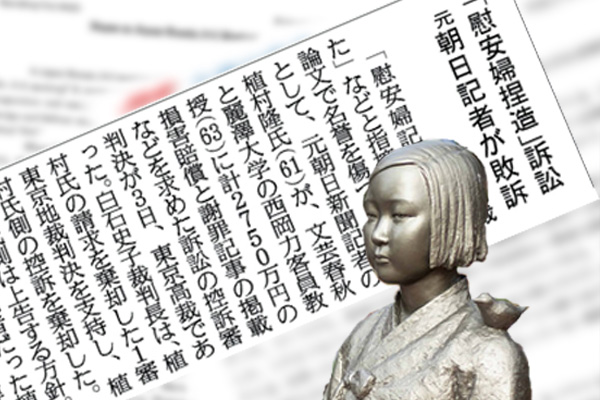On March 3, a high court gave me a perfect victory in a libel case in which former Asahi Shimbun newspaper reporter Takashi Uemura sued me for criticizing his reports on a former Korean comfort woman as fabrications in my book and magazine articles. The victory followed a similar one at a district court. Uemura’s reports on Kim Hak Sun came in August and December 1991.
High court rules Uemura’s reports as fabrications
There are two requirements for a libel damages suit to be turned down. The first requirement is that the theme is of a public nature and the purpose is for public benefit. The second is that the written fact is true or reasonability believed to be true.
A commentary about a byline story on a newspaper as a public organ is of a public nature and for public benefit, both the district and high courts easily recognized. At issue was the trueness of three facts I pointed out in my commentaries. I quote the facts from the high court ruling:
(1) The appellant (Uemura) was aware that Kim Hak Sun was sold as a kisaeng (traditional Korean female entertainer) because of economic poverty, but he dared not to write the fact in his reports because it was inconvenient for his assumption that she was coercively recruited by authorities.
(2) The appellant intentionally wrote the factually inaccurate reports to maintain the assumption of authorities’ coercive recruitment and support a suit (for damages to former comfort women) filed by his mother-in-law who was among leaders of an association for families of war victims.
(3) The appellant dared to write the factually inaccurate reports claiming that Kim Hak Sun was coercively recruited as a “woman volunteer” (for factory works) and brought to a battlefield where she was forced to have sex with Japanese.
The high court as well as the district court recognized the first and second points were reasonability believed to be true and the third point was true. The recognition of the trueness regarding the third point is particularly important. The court ruling effectively said that Uemura did not identify the Japanese military’s coercive recruitment but dared to write the factually inaccurate reports. Like my commentaries, the rulings concluded that Uemura’s reports were fabrications.
Rebuttal to Uemura
A weekly magazine presided over by Uemura has asserted that I at the trial admitted my own fabrications in the book and comment. I simply rebut the assertion. First, a misquotation from the Hankyoreh newspaper found by Uemura and his associates in my book titled “Understanding the comfort women issue” was corrected in the second printing of the book’s paperback version published on September 5, 2014, before Uemura filed the libel suit. Surprisingly, a copy of my book that Uemura submitted to the court was that of the paperback version’s third printing after the correction. In the copy, the misquotation was clearly corrected.
Second, as for my comment on the weekly magazine Bunshun saying that Kim Hak Sun in her legal complaint wrote that she was sold by her parents to become a comfort woman, Uemura and his associates claimed that Kim Hak Sun’s complaint did not include such passage. However, the complaint said that she quit an ordinary school because of poverty, was adopted to enter a kisaeng school and brought by her adoptive father to a Japanese military comfort station. For an expert well aware of the then social conditions, the passage means that she was sold by her parents and became a comfort woman. In my comment on the magazine that differs from any academic book, I summarized the meaning. It is unreasonable to criticize the comment as representing a fabrication or an intentional lie.
Tsutomu Nishioka is a senior fellow and a Planning Committee member at the Japan Institute for National Fundamentals and a visiting professor at Reitaku University. He covers South and North Koreas.


